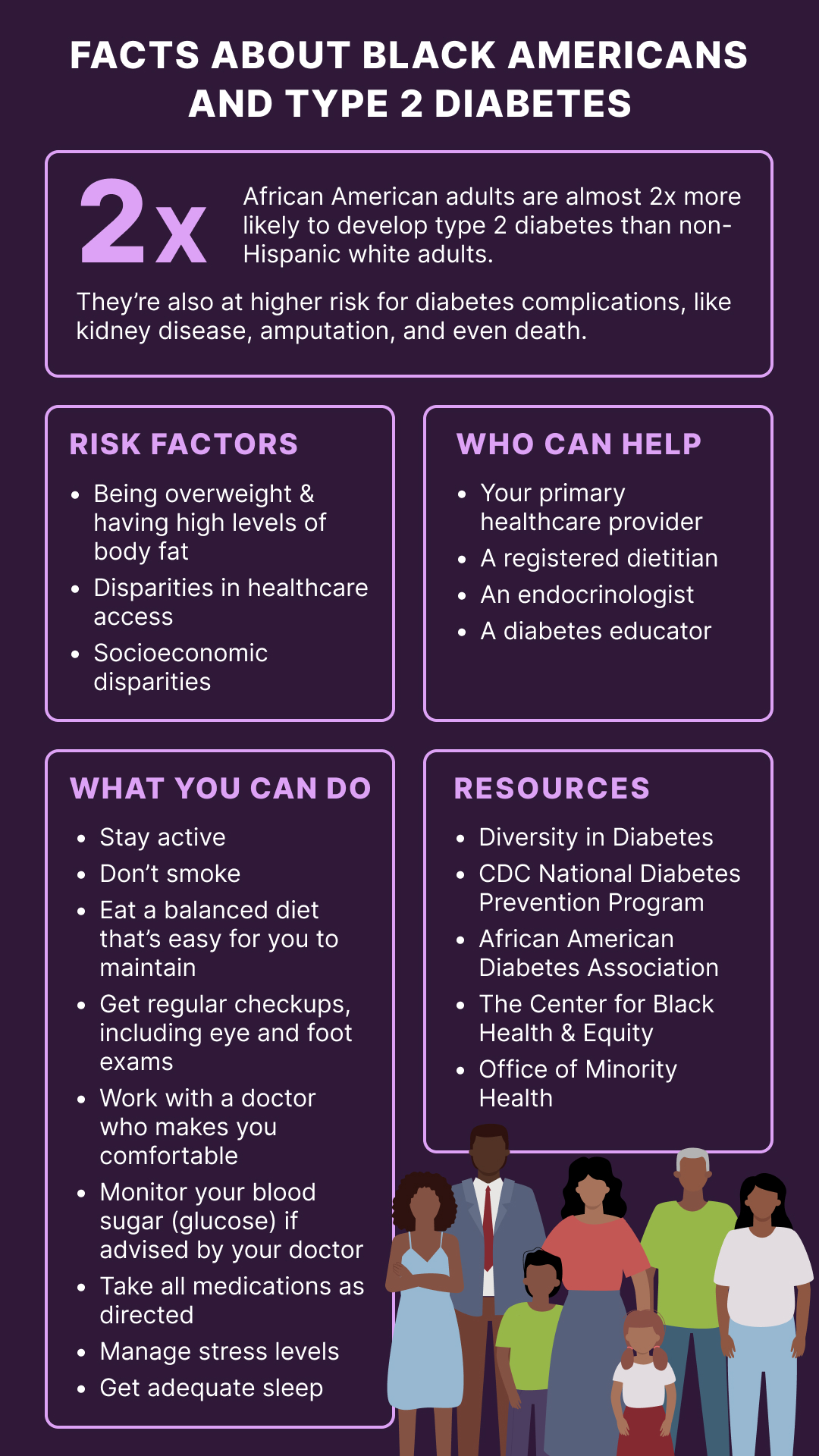Black Americans and Type 2 Diabetes: What to Know

If you’re Black or African American, here’s what to know about your risk for type 2 diabetes and ways to feel more empowered in managing your health.
1. Your Risk of Diabetes May Be Higher than Average
Type 2 diabetes affects people of all races and ethnicities, but it doesn’t affect all groups equally.
According to data from 2021, about 13% of African American adults are diagnosed with diabetes. That’s higher than the average (10%) in the general population, and 1.8 times the likelihood of non-Hispanic white adults.
African Americans may also have increased risk of diabetes-related issues including:
- Eye symptoms, including blindness
- Kidney disease
- Heart disease
- Amputations
- Hospitalization
- Death
2. Some Risk Factors Are Within Your Control
Many societal factors that are outside a person’s individual control — including disparities in access to healthcare, wealth, nourishing food, and more — can influence a groups’ health outcomes.
However, certain lifestyle factors you can modify. For example, a significant risk factor for type 2 diabetes is being overweight. According to some research, weight is actually the biggest driver of the disparity.
Taking control over your own habits around diet, exercise, and smoking can help decrease your risk of diabetes or help make living with diabetes more manageable. If you have diabetes, losing just 5-10% of your bodyweight can help with blood sugar control. This may also help prevent complications.
3. You Can Advocate for Your Health
These strategies can help you keep yourself as healthy as possible:
- Find a healthcare provider who listens, understands, and supports you.
- Learn as much as you can about diabetes from your healthcare provider, community members, and trusted online resources.
- Follow best practices for preventing and managing diabetes, including getting enough exercise, managing stress, avoiding smoking, and eating a well-balanced diet that’s low in sugar and high in non-starchy vegetables and protein.
- Talk to your doctor about healthy and realistic weight loss strategies, if weight loss is a goal.
- Monitor your blood glucose levels regularly if you have diabetes.
- Be your strongest advocate in the doctor’s office by requesting all screening tests if you have or are at risk for diabetes. These may include A1C tests and foot and eye exams.
- Take any medications as your healthcare provider directs you to, and talk to your provider if you’re having trouble obtaining or taking your medication as prescribed for any reason.
- Work with a registered dietitian who can offer you recipes and tips that incorporate or modify your favorite foods.
4. Resources Are Available for Support
You should expect your healthcare provider to be a valuable partner in managing your unique health as an individual. If you need to find a culturally sensitive provider, you can search on Diversity in Diabetes or by asking people in your network for recommendations.
You may also find these resources helpful for further information and support:
- Centers for Disease Control and Prevention: National Diabetes Prevention Program
- African American Diabetes Association: Diabetes Resources
- The Center for Black Health & Equity: Food and Nutrition
- Office of Minority Health: Diabetes and African Americans
Want to Read More?
Access all of Dario Connect’s content, community, and experts for free!
Already a member? Login
Want to Read More?
Access all of Dario Connect’s content, community, and experts for free!
sign UP For FreeAlready a member? Login

